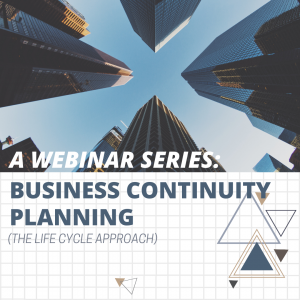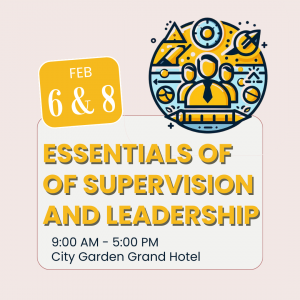Description
Rationale
In an ever changing and increasingly challenging world, stress is inevitable. Living in the midst of unprecedented challenges not only personally, locally but even globally, anything can happen. The unpredictability and volatility of events can cause unrest not only mentally, but also emotionally and spiritually. More and more, we realize that coping is not something we can wait to acquire accidentally, but a skill we should learn and practice actively.
In this learning workshop, we will learn about the science of stress and the different ways we can increase our ability to cope healthily amidst the most trying of times. The session will also introduce you to a new coping mechanism: Self-compassion. It is a new concept that when fully understood can be a great ally in keeping ourselves mentally, spiritually and emotionally healthy even in times of crisis.
Through lecture, breakout discussions, group sharing, practical exercises and reflection, participants will emerge for the training more equipped with healthy coping mechanisms that are easy to implement.
Objectives:
At the end of the session, participants will :
- Develop the confidence and skills needed to welcome change as an opportunity to grow, learn, and build the organization.
- Support, guide, and quickly adapt to the organization’s ever changing needs and demands for growth, leadership, and stability.
- Understand what stress is and how it affects our health.
- Learn the concept of Self-compassion and Identify practical practices that increase our ability to cope with stress.
- Recognize the importance of relationship at work in keeping yourself mentally healthy.
- Initiate action on areas they can influence.
Course Outline
A. Managing Change
Learning Objectives: In this module participants will be able to learn how to effectively manage personal and organizational changes and motivates others through the changes process.
- The V.U.C.A World
- Volatility – Rapid and unexpected challenges
- Uncertainty – Pending change: known “unknowns”
- Complexity – Multiple key decision factors: many variables to consider
- Ambiguity – Too many unknown “unknowns”
- What has changed?
- What can and must be done differently?
- Paradigm shift: Seeing change from different perspectives
- Motivating the self
- Enabling others
- Re-tooling to manage change
- Making Positive Changes
- For business results
- For personal development: Managing change proactively
B. Understanding Stress
Learning Objective: This module will explore what stress is and why it is important to understand how it affects the way we function.
- Stress defined
- Physiology of Stress
- Triggers of Stress
C. Overall Personal Wellbeing
Learning Objective: Participants will understand the different components of personal wellbeing and why it is important to be integral in approaching wellness.
- Components of Personal Wellbeing
-
- Physical
- Mental
- Emotional
- Spiritual
- Manifestations of Challenges to our Personal Wellbeing
-
- Physical
- Mental
- Emotional
- Spiritual
D. Coping Mechanism: Self-Compassion
Learning Objective: Participants will be introduced to the concept of self-compassion and its role in increasing one’s ability to cope with stress.
- Self-Compassion Defined
- Three Pillars of Self-Compassion
- Practicing Self-Compassion
E. Creating a Supportive Environment
Learning Objective: Participants will learn the importance of creating a supportive environment in practicing mental health.
- Managing difficult people in stressful situations
- Creating A Support Program for Stress Management
F. Action Planning – The Change Agent: Initiating action
Methodology
This two workshop will be delivered in an online learning format. The online classes will be composed of lectures, breakout discussions, group sharing, practical exercises and personal reflection.
Registration:
- Click on the add to cart button.
- In the cart, click on the Proceed to Checkout.
- Kindly fill out the necessary details.
- Choose between Bank Deposit or PayPal (Will also have Credit/Debit Card options)
- If you have chosen to pay via Credit/Debit Card, a PayPal payment site will pop up. Click Pay with Debit or Credit Card and fill out the necessary details.
- If you have chosen to pay via PayPal, a PayPal payment site will pop up. Log in with PayPal account and proceed to pay with your account.
- If you have chosen to pay via Bank Deposit, simply click Place Order after filling out the necessary details.
To receive the webinar access link:
- Payment through bank deposit.
- Please email your validated deposit slip with your company name, order number, and attendee name/s to [email protected]. You will receive your webinar link once payment is confirmed.
- Payment through PayPal/Debit or Credit Card
- You will receive your webinar link via e-mail automatically within the day.




